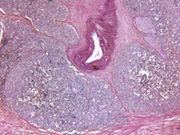Insufficiency/deficiency of serum 25-OH D linked to increased odds of adverse pathology
WEDNESDAY, Feb. 24, 2016 (HealthDay News) — For men with localized prostate cancer undergoing radical prostatectomy, serum 25-hydroxyvitamin D (25-OH D) insufficiency/deficiency is associated with increased odds of adverse pathology, according to a study published online Feb. 22 in the Journal of Clinical Oncology.
Yaw A. Nyame, M.D., from the Cleveland Clinic, and colleagues conducted a cross-sectional study nested within a large epidemiologic study of 1,760 healthy controls and men undergoing prostate cancer screening. Within the cohort, 190 men underwent radical prostatectomy. The correlation between adverse pathology at the time of radical prostatectomy, defined as presence of primary Gleason 4 or any Gleason 5 disease, or extraprostatic extension, and 25-OH D levels was assessed.
The researchers identified adverse pathology at radical prostatectomy in 45.8 percent of the cohort. Men with adverse pathology at radical prostatectomy had lower median serum 25-OH D than their counterparts, on univariate analysis (22.7 versus 27.0 ng/mL; P = 0.007). Serum 25-OH D <30ng/mL correlated with increased odds of adverse pathology after adjustment for age, serum prostate-specific antigen, and abnormal digital rectal examination (odds ratio, 2.64; P = 0.01).
“Serum 25-OH D may serve as a useful biomarker in prostate cancer aggressiveness, which deserves continued study,” the authors write.
One author disclosed financial ties to GlaxoSmithKline. One author is co-inventor of a urine assay for prostate-specific antigen enzymatic activity.
Copyright © 2016 HealthDay. All rights reserved.








